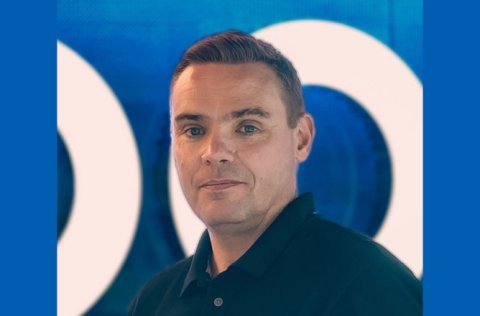CNME Editor Mark Forker spoke to Steve Rafferty, Head of APAC & EMEA at Zoom, and Ben Neo, Head of Contact Centre and CX Sales at Zoom, to find out how their suite of communication solutions are transforming the Contact Centre space, the unique capabilities of its AI Companion 3.0, the company’s unwavering commitment to driving value for their customers – and how unlike many of its rivals, Zoom is not focused on servicing debt, but instead on serving its customers with seamless experiences.

Steve Rafferty is a hugely respected business leader in the IT industry across the EMEA and APAC regions.
In what has been a distinguished career to date, Rafferty has worked in senior leadership roles for companies such as Avaya, BT, and RingCentral.
In February 2024, he joined Zoom, and after 7 months as Head of EMEA, he was tasked with the responsibility of also driving their growth across the APAC region.
Under the direction of Founder and CEO Eric Yuan, Zoom has become one of the biggest companies in the world.
Its popularity exploded during the early days of the COVID-19 pandemic, and the company became mainstream with the public as a result of that, but since that it has gone from strength-to-strength, and is renowned and revered for its seemingly unsatiable appetite to develop new innovations and products.
CNME managed to secure an interview with Rafferty, and we began the conversation by asking him about Zoom’s federated approach and architecture.
Rafferty doubled down on the fact that Zoom’s guiding principle is to deliver real value to their customers, and he believes in a collaborative approach.
“When you think of phone, we have a native phone where organisations can buy the entire piece from us, but when you look at large organisations, they tend to bring their own carrier because they have a network and security contract, and they also want to take the collaboration suite as well. AI is very similar in that respect, there are a huge number of businesses that have relationships with Amazon, Google or Microsoft. They want to nurture and maintain those relationships, and to be honest we don’t want to fight them. I think all the big AI players need to get together and deliver what is best for the customer. There’s been so much rip and replace in this industry, and sometimes you really have to ask where is the value to the customer – and I think a lot of organisations really need to start thinking more about the customer. One of the core principles that Eric founded the company on was to provide happiness to customers, firstly in the quality of the product, but also in value. At Zoom, we’re not out in the market saying our AI is better than yours, what we are really looking to do is to work out and determine what is best for our customers,” said Rafferty.
Rafferty detailed many benefits of Zoom’s new AI Companion 3.0, but he highlighted the time to cost savings on a traditional business plan to demonstrate the power of AI Companion 3.0.
“I think one of the key features in AI Companion 3.0 is the agentic AI element, which is the physical ability to do things for you, rather than suggesting things for you to do. I came into the business over 12 months ago, and the first thing that I wanted to do was look at the business as a whole, and build a plan around how do we deliver value to customers and how do we deliver value to shareholders? Now, you can imagine trying to find that information in an organisation of our size. By using AI Companion, I was able to submit clear and concise prompts, and that started bringing all these insights to the surface that then allowed me to test it with all the subject matter experts in the business, and that allowed me to put a business plan together in 2 weeks, and in a previous life would’ve taken 9-12 months. AI Companion 3.0 is turning data into information and it’s prompting you to do things that you never ever thought about in the past, and that’s powerful,” said Rafferty.
Rafferty said there are many factors that differentiate Zoom from other market players, but he did reference that the fact they weren’t servicing capital debt was crucially important, as that ultimately allowed them the freedom to think outside the box and look at the market with a much broader outlook.
“We have a lot of market advantages, and one of them is the fact that we’re not servicing debt. We’ve been practical, and that’s been the approach from day one, even before COVID, which people sometimes tend to forget. This enables us to rapidly develop products that our customers need in the market. There are a lot of challenges in this industry, and a lot of companies are having to service debt, rather than serve customers, which is a real problem for them. Whereas we don’t have that issue, so that enables us to take a longer-term view on things to drive new innovations, and examine certain trends that are emerging within the marketplace. Eric and the team decided to build a product for the Contact Centre about 3 years ago, and they just totally went for it. They were acutely aware of the fact that it wasn’t about delivering revenue straight off the bat, but they knew that by having a product that was built around AI, that didn’t have any technical debt was enabling customers to deliver what they needed, and that put us in a really strong position,” said Rafferty.
It is well-documented how important the channel is to enter the marketplace in the Middle East.
However, the channel market in the region is at saturation point, so identifying the right partner for you can be a challenge, but Rafferty outlined what they look for.
“There are two sides to it when it comes to identifying channel partners. The first side of it is the install base, because there is a lot of legacy that needs to be migrated. We’re trying to work with those partners and examine ways in which they can innovate with Zoom. The second side of it is looking at these consultancies that are starting to emerge, and who are thinking about things in AI, that quite frankly a lot of us are not doing, and these consultancies are also delivering use-cases. The first two things we’ve done is sign two really strong distributors to cover the region and give us the reach we need. We’re focusing on individual organisations in countries like the UAE and KSA and the surrounding areas, and again our primary objective is to drive the best value for our customers,” said Rafferty.
Rafferty concluded the conversation by stressing that they are asking their channel partners to think differently when it comes to their business.
“We’re trying to get our channel account managers to think like business owners. They’ve got two key jobs, the first is to drive profit for themselves, and the second is to drive their customer forward. So, rather than adopt the approach of let’s train you up to use our product, where’s the pipeline? We’re adopting an approach that asks them what is your board’s objectives, where do you want to be in 12 months? Once we have asked those questions, let’s put a plan together to see where we fit into that. It’s been a challenge for some of the distributors to get their head around that type of approach, but it is vital that we do it. We want the partner to own the relationship with the customer, and ultimately, we want our channel partners to make money around the whole solution,” said Rafferty.
CNME also managed to get the opportunity to speak to Ben Neo, who heads up sales for CX and the Contact Centre space at Zoom.
Like Steve Rafferty, Neo has enjoyed a decorated career in the communications space, and has worked with companies such as Nortel, Vodafone and Mitel, before joining Zoom in 2021.
Zoom was recognised by Gartner in the 2025 Magic Quadrant for Contact Centre as a Service (CCaaS), which marked its inaugural inclusion in the report since launching its contact centre product back in 2022.

Analysts feel the recognition validates their AI-first strategy, and Neo described the recognition by Gartner as ‘unprecedented’.
“It is amazing to get that Gartner recognition, because it carries a lot of weight behind it, particularly in markets like the Middle East. It has taken a lot of hard work to get to that recognition from an independent entity like Gartner. They have certain gates that businesses need to hit when it comes to the selection criteria, such as product innovation, international presence, revenue numbers and so on. However, to hit all those gates and get that recognition within 3 years is unprecedented,” said Neo.
Neo praised the innovation that is firmly embedded into the lineage of Zoom as a company and issued a stark reminder to those who put R&D and innovation on the backburner.
“This market now, especially with the advent of AI means that if you’re not innovating then you’re eventually going to become irrelevant and obsolete. It’s getting much more personalised too, and it’s not just us that is driving it. There are other players in the market that are driving it too, such as Salesforce and ServiceNow. In addition to this, there are a few niche players in local markets too, particularly in the Middle East region. At the end of the day, given the state of play in the market, you have to keep up, and you have to keep innovating. It is very important for us to continue to drive innovation, and it certainly does help when the CEO of the company is an engineer by trade. He is constantly driving our product teams to find out what’s coming next, and that sort of culture lends itself to developing high-quality products that deliver real value to customers,” said Neo.
Neo echoed the sentiments expressed by his colleague Steve Rafferty, by emphasising just how important the channel is.
He explained the thought process and criteria that they look for when searching for channel partners in the contact centre space.
“Look, you can’t enter the market in the Middle East without the channel, and we are investing a lot in the region. The channel is the way to market, and whether that is a relationship, or a procurement factor, we recognise that the channel is critical. We do very little direct business in the Middle East. When it comes to the contact centre space, we are looking for partners that have got a CX background, now typically in the Middle East, if they have a CX background, then they’ll have a telephony background as well. You very rarely will see someone from a networking background try to jump into CX. We’re working with a couple of well-known and established partners across the UAE and KSA, and they could see what we were doing, and they were proactive in terms of wanting to work with us. In many ways, it was a meeting of minds. They could see it, and we like people who can see where the market is headed,” said Neo.
When it comes to how Zoom tries to position itself in a crowded UCaaS space in the Middle East, Neo pointed to the power of the platform.
“We’re coming at the market from a very different angle. We’re approaching it from a platform perspective, so whether you want to do telephony, or contact centres, you can start wherever you want, but the fact of the matter is that everything else that comes up can be put on the platform. That allows businesses to consolidate a lot of these services that they might have from different vendors and make it simple, and of course with AI, if it is learning from all the same interaction types across it then it all makes sense,” said Neo.
Neo pointed out the three different types of business that they typically work with at Zoom.
“Generally, we’ve got three different types of businesses that we work with. The first business is someone that has a legacy technology problem and they must make a decision. The you’ve got the businesses who have made that decision and have gone to cloud early but are struggling to adapt to the demands and rigours of the cloud, and then the final part is a business that just wants to do something completely different. In the KSA, we’re seeing more organisations that just want to do something totally different,” said Neo.
Neo concluded a terrific discussion by highlighting some of the interesting conversations he’s having with customers in Saudi Arabia, which has triggered a demand for Zoom Kiosks.
“We are having more and more conversations around how video can play a role in a particular customer journey. We are also having a conversation with a pharmaceutical chain in the KSA, who sell vapes, around the installation of Zoom Kiosks. Zoom Kiosks are almost like video kiosks where you can get skill base and intent base rooted to an agent, and they appear in video form and they advise on the vape types that you need, so that is a prime example of a company looking to do something outside of the box. There is still an agent sitting somewhere that is doing something, but how do you get access to that agent if you’re in a store, so that’s where they saw an opportunity with Zoom Kiosks. Our story is CX, everything that is touched is CX, it just happens to be technology that underpins all of that, and we’re just using it differently,” said Neo.





